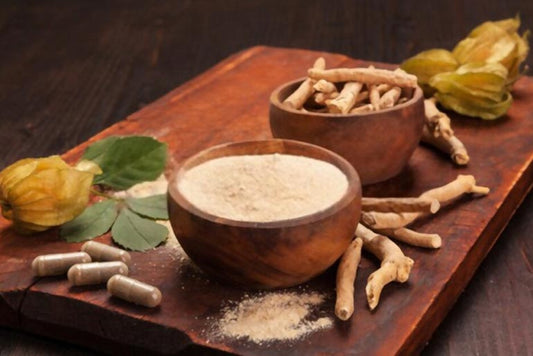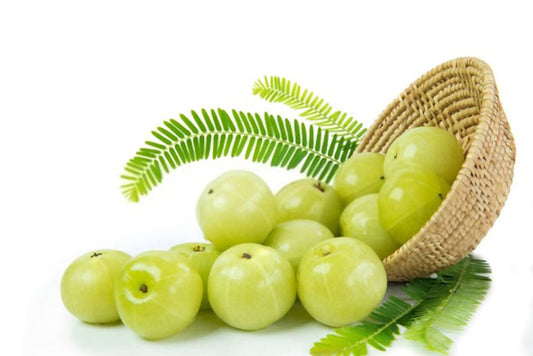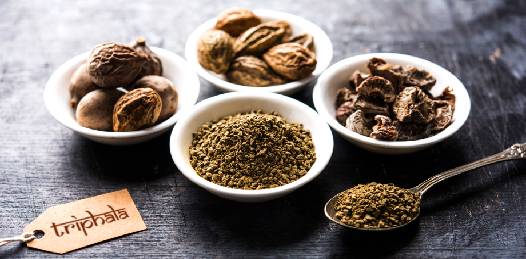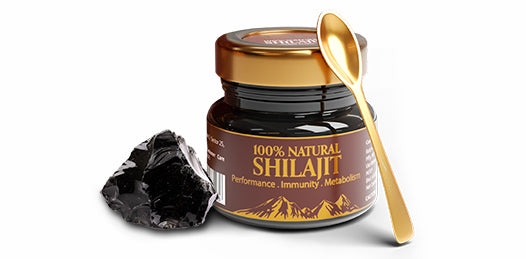
Vernacular Names
Ashwagandha trees are found all over India and in some parts of Nepal.
- Botanical Name - Withania Somnifera
- Common Name - Indian ginseng, Winter Cherry, Withania root
- Hindi Name - Ashwagandh
- Punjabi Name - Asgand
- Gujarati Name - Asam, Asoda, Ghodasoda
- Marathi Name - Asgundh, Kanchuki, Askandha
- Urdu Name - Asgandanagaori
- Bengali Name - Ashvagandh
- Malayalam Name - Amukkuram
- Tamil Name - Asuragandi
- Kannada Name - Asvagandha
- Telugu Name - Asvagandhi, Penneru
Nutritional composition of Ashwagandha
Ashwagandha root is rich in micro and macronutrients including iron, calcium, carotene and Vitamin C.
Ashwagandha has plant-based adaptogens that improve brain and neurological functions and natural antioxidants to boost immunity slows down ageing and relieves stress.
Effect of Ashwagandha on Tridoshas
Vata, Pitta and Kapha are the Tridoshas upon which the whole Ayurvedic science is based upon.
Tridoshas are present all over the body and is responsible for all physical, mental and emotional characteristics of an individual. All the food and herbs we consume and our lifestyle practices maintain the balance of Ayurvedic doshas in the body.
Ashwagandha, being hot in potency decreases the Vata and Kapha dosha. When taken with milk or ghee, it also balances the Pitta dosha.
Benefits of Ashwagandha
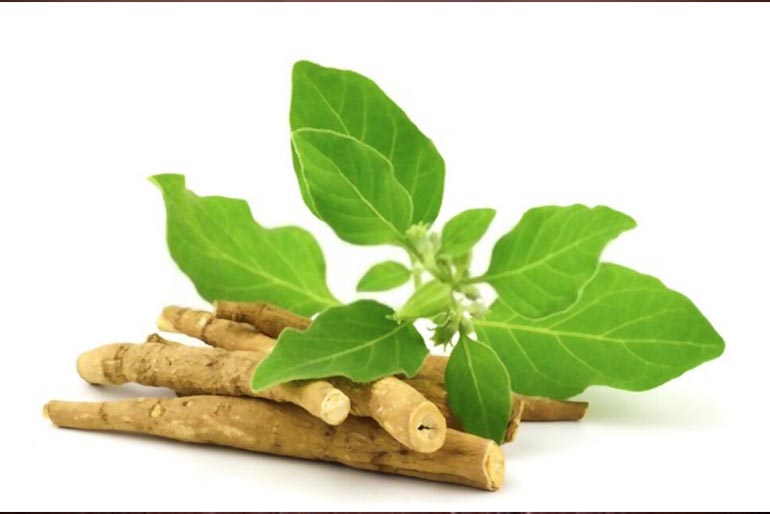
Hypertension: High Blood pressure is a condition when the pressure exerted by the blood exceeds the normal value. Normal blood pressure is 120-139/80-89 mm/Hg for adults. It is called prehypertension when the blood pressure rises over 140-159/ 90 mm/Hg. Prehypertension indicates an increased chance of developing hypertension in the future.
The symptoms of hypertension include headaches, loss of focus and concentration, shortness of breath, nose bleed, irregular heartbeat, chest pain and blurred vision. Some also experience fatigue, restlessness and pain in the arms and chest region. According to Ayurvedic science, high blood pressure is due to aggravation of vata dosha. Hence, all measures have to be taken to reduce Vata dosha. Ashwagandha is adaptogenic that helps the body to adapt to stress. It does not only lowers blood pressure but also reduces stress, anxiety and improves mood.
Ashwagandha can be taken in the form of a concoction once or twice a day on an empty stomach. Ashwagandha tablets or capsules can be taken at a dosage of 250mg to 1 gm per day in divided doses according to the degree of hypertension. Powder of Ashwagandha mixed with warm water or juice of Brahmi is very useful for hypertension.
Stress & Anxiety: Stress stimulates a response where your body starts releasing hormones into the system. These hormones temporarily cause the heartbeat to rise causing palpitations. Stress also causes inflammation in the blood vessels leading to episodes of hypertension, headaches, confusion and palpitations in some individuals. Ashwagandha is adaptogenic and works very well on stress. Ashwagandha relaxes the body and mind when taken with milk or mixed with ghee.
Immunity: Ashwagandha possesses potent antioxidant properties that help protect against cellular damage caused by free radicals. Ashwagandha also comes under the Rasayana group of herbs in Ayurveda. They are rejuvenating herbs that increase the Ojas or vitality in the body. Ojas ensures the healthy functioning of the organs, brain and mind. Ashwagandha has to be taken for 6-8 weeks for building immunity with warm milk, honey or warm water.
Depression: Ashwagandha is an antidepressant herb that helps people cope up with the symptoms. It relieves stress, anxiety and calms the mind. Antidepressant medications might have a sedative effect that can impair their daily activities. Ashwagandha helps to bring clarity to the mind.
Sleep: At a high dose, Ashwagandha has a sedative effect. It can be taken with a cup of milk the night before sleep to bring out the effect. It also relaxes the muscles and mind to give sound sleep. It can be safely used in children, lactating mothers and the elderly.
Diabetes: Ashwagandha is hot in potency, has a bitter and pungent taste and becomes pungent after digestion. Hence it is very helpful in managing blood sugar levels. It also strengthens the nervous system and prevents long-standing diabetic complications like neuropathy, nephropathy and retinopathy.
Sexual Disorders: Ashwagandha is a potent rejuvenating herb that helps to improve the quality and quantity of reproductive fluids. It is used to improve strength, stamina and vigour in men. Ashwagandha is often used in the treatment of premature ejaculation, erectile dysfunction and infertility.
Joint Disorders: Ashwagandha is a vata pacifying herb and helps in managing pain and stiffness in the body. Ashwagandha is very useful in managing rheumatoid and osteoarthritis. Ashwagandha tablets or capsules or powder taken regularly with warm water or milk helps reduce pain in the management of joint disorders.
Muscle Building: Ashwagandha benefits muscle strength and mass. Supplementing with Ashwagandha extracts or powder helps fitness freaks who want to increase muscle mass and also for those who are underweight. Ashwagandha also reduces the recovery time between workout sessions and boosts muscle repair at a faster pace. This is also one of the Ashwagandha’s benefits for men.
How to use Ashwagandha powder at home?
Ashwagandha powder can be easily added to some of your recipes to reap its benefits. Adding Ashwagandha to food also masks its earthy taste. Here are some top tips:
- Ashwagandha powder can be blended into your smoothies along with other vegetables/ fruits, and milk or yogurt. This can be taken regularly by those who want to gain weight or muscles. This is one way you can gain weight naturally without taking any artificial protein shakes.
- Ashwagandha Tea: Ashwagandha can be consumed as tea. Boiling Ashwagandha root with other immune-boosting herbs like Tulsi, Giloy, Black Pepper and Dry Ginger can be taken once or twice a day as a tea to boost immunity and promote strength. This Ashwagandha Tea also is a strength promoter and keeps the body warm.
- Ashwagandha powder can be added to a hot cup of milk and taken in the night before sleep. This improves sexual functions, reduces stress, anxiety and sleep.
- Ashwagandha churna can be mixed with honey and consumed twice or thrice a day before food to boost immunity.
- Ashwagandha coarse powder can be made into a decoction by boiling with water. This concentrated decoction should be strained and taken before breakfast and dinner to promote muscular strength.
- Ashwagandha churna can be mixed with ghee, milk and sugar candy and made into a paste. Consuming this paste regularly helps to improve body weight.
Dosage of Ashwagandha
- Ashwagandha churna is taken in a dosage of 3-6 gms per day mixed with honey, ghee, warm water or milk.
- The dosage of Ashwagandha tablets or capsules is 250 mg - 1 gm per day.
- The root decoction is taken at a dosage of 50ml to 100 ml per day.

Adjuvant drink for taking Ashwagandha
Anupan or Adjuvant is a food or drink with which the medicine is taken. The adjuvant increases the efficacy of the drug and facilitates easy movement and absorption in the gut.
Ayurvedic Physicians select adjuvants according to the dosha imbalance in an individual.
- Ashwagandha powder is advised to be taken with Sesame Oil or curd to cure disorders of Vata imbalance. Warm water is taken right after consuming this mixture to facilitate proper digestion. This cures disorders of the muscular and nervous system like muscular dystrophy, muscle wasting, paralysis, brain and neurological disorders.
- Ashwagandha powder is administered with ghee in case of burning sensation or any pitta related disorders. Warm water has to be taken after consuming this combination.
- Honey is taken with Ashwagandha Powder to cure diseases of the chest. Ashwagandha is an adaptogen and also promotes immunity. Water at room temperature is to be taken after consuming this combination.
Precautions:
- Ashwagandha is a mildly heat-producing herb, hence the dosage has to be monitored while using this herb in extreme summers or by a person with Pitta Prakriti.
- Ashwagandha is slightly heavy to digest. Hence it is advisable to avoid Ashwagandha when you have indigestion.
- It is best to avoid Ashwagandha during pregnancy, while it is safe for lactating mothers.
- Ashwagandha may decrease blood pressure or interfere with blood pressure medications. Ashwagandha should be used with caution in people taking antihypertensive medication.

Ashwagandha Side effects
There are no side effects of Ashwagandha when taken in controlled doses. If you note symptoms of indigestion, weight gain, drowsiness, irregular heartbeat or low blood pressure, stop usage and consult an Ayurvedic doctor, for this could be due to some toxins in the body.
Common FAQs about Ashwagandha
-
How long can you take Ashwagandha?
Generally, any herb can be taken for a period of 45 days to 90 days and a small break of one to weeks before continuing it further.
-
Can you get addicted to Ashwagandha?
Ashwagandha is not a habit-forming herb. If you are taking it for stress or anxiety, the dosage has to be tapered steadily before stopping to take the herb.
-
Is there any best season to take Ashwagandha?
There is no particular best season to take Ashwagandha. However, if you are taking Ashwagandha to improve sexual strength and stamina, it is better advised to take it in winters due to its hot potency.
-
Is there any specific time for taking Ashwagandha? How long does Ashwagandha take to show results?
There is no specific period for taking Ashwagandha. Once started, the herb starts showing results within a week or two depending upon the condition.
-
Can Ashwagandha be given to children?
Yes, Children can also take Ashwagandha, however, the dosage is monitored. In children, this herb promotes proper growth of the muscular and nervous systems and cognition. When consumed in larger quantities, Ashwagandha may cause digestive problems in children.
Now, you know how to use Ashwagandha and its benefits, how about adopting this wonder herb and hence Ayurveda into your lives!





